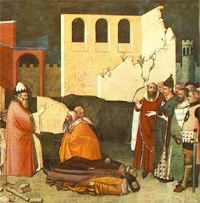
The Plague
There is an enormous amount of scholarship on the Plague and the discussion about its causes, origins and effects on 14th-century culture and society is still raging. Two classic studies on this topic are: David Herlihy, The Black Death and the Transformation of the West, Cambridge: Harvard University Press, 1997; and Philip Ziegler, The Black Death, London, Collins, 1979. Among more recent contributions, in English: John Aberth, The Black Death: The Great Mortality of 1348-1350, Bedford Saint Martin, 2005; Shona Kelly Wray, "Boccaccio and the doctors: medicine and compassion in the face of the plague," Journal of Medieval History; Sept. 2004, Vol. 30 Issue 3, p.301-322, and Samuel Kline Cohn, Jr., “The Black Death: The End of a Paradigm,” The American Historical Review 107.3 (June 2002): p.703 (36).
In this section, you will find accounts by Boccaccio's contemporaries, as well as some information on how the Plague was viewed and interpreted in Medieval Medical and Religious Tracts.
Update 2012, a note by Monica Green, Professor of History, School of Historical and Religious Studies, Arizona State University, received on Sept. 17, 2012. Prof. Green is the organizer of a major session at the 2013 American Historical Association annual meeting (held in New Orleans, January 3–6, 2013) entitled: "Re-Mapping the Black Death."
She writes: "Plague studies are in the midst of being revolutionized because of work in genomics." For a very helpful guiding hand through all that has happened over the past decade and a half in this area of research, see the section: Scientific Causes of the Plague (link below).
- Contemporary Perspectives
- Origins
- Causes
- Effects